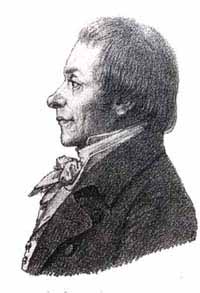- Joseph Lakanal
Infobox Scientist
name = Joseph Lakanal
box_width =
image_width =150px
caption = Joseph Lakanal
birth_date =July 14 ,1762
birth_place = Serres,Ariège
death_date =February 14 ,1845
death_place =Paris
residence =
citizenship =
nationality =
ethnicity =
field =
work_institutions =Institut de France
alma_mater =
doctoral_advisor =
doctoral_students =
known_for =
author_abbrev_bot =
author_abbrev_zoo =
influences =
influenced =
prizes =
religion =
footnotes =Joseph Lakanal (
July 14 ,1762 –February 14 ,1845 ) was a French politician, and an original member of the "Institut de France ".Early career
Born in Serres,
Ariège , his name was originally "Lacanal", and was altered to distinguish him from his Royalist brothers. He studiedtheology , and joined one of the teaching congregations ("Pères de la Doctrine Chrétienne"), and for fourteen years taught in their schools. He was professor ofrhetoric atBourges , and ofphilosophy atMoulins .He was elected by his native "département" to the
National Convention of the French Republic in 1792, where he sat until 1795; Lakanal was one of the noted administrators of theFrench Revolution . At the time of his election, he was acting asvicar to his uncleBernard Font (1723-1800), the constitutional bishop ofPamiers . In the Convention, he sat withThe Mountain and voted for the execution of King Louis XVI.Projects and reforms
Lakanal became a member of the
Committee of Public Instruction early in 1793, and after carrying many useful decrees on the preservation of national monuments, on the military schools, on the reorganization of the "Jardin des Plantes " as the "Muséum national d'Histoire naturelle ", and other matters (such as the creation of the "École publique des Langues Orientales vivantes"), he brought forward on June 26 his "Projet d'éducation nationale" (printed at theImprimerie Nationale ), which proposed to lay the burden orprimary education on the public funds, but to leavesecondary education to private enterprise; public "fête s" were also assigned specified sums, and a central commission was to be entrusted with educational questions.The project, to which
Emmanuel Joseph Sieyès also contributed, was refused by the Convention, who submitted the whole question to a special Commission of six, which, under the influence ofMaximilien Robespierre , adopted a report byLouis-Michel Le Peletier de Saint-Fargeau (shortly before his tragic death).Lakanal, who was a member of the commission, now began to work for the organization of
higher education , and, abandoning the principle of his "Projet", advocated the establishment of state-aided schools for primary, secondary and university education. In October 1793, he was sent by the Convention to the south-western "départements" and did not return toParis until after the revolution of Thermidor that toppled Robespierre.Thermidor and Directory
He became president of the Education Committee, and promptly abolished the system which had had Robespierre's support. He drew up schemes for
normal school s of "départements", for primary schools (in accordance with his previous "Projet") and central schools; Lakanal accepted resolutions against his own system, but continued his educational reforms after his election to theCouncil of the Five Hundred in 1795.In 1799 he was sent by the Directory to organize the defence of the four "départments" on the left bank of the
Rhine (inAlsace and Lorraine), threatened by (theSecond Coalition ).Later life and exile
Under the Consulate and Empire, Lakanal resumed his professional work, as a professor at the
Lycée Charlemagne , and after thebattle of Waterloo (1815), he retired to theUnited States . He was welcomed there by PresidentJames Madison , and theUnited States Congress gave him a grant of 500acre s (2 km²) in theVine and Olive Colony inAlabama . He then later became a planter, and was afterward chosen president of the "University of Louisiana", known today asTulane University .He returned to France in 1834, and published in 1838 an "Expos sommaire des travaux de Joseph Lakanal". Shortly afterwards, in spite of his advanced age, Lakanal married a second time. He died in Paris; his widow died in 1881. Lakanal's "éloge" at the
Academy of Moral and Political Science , of which he was a member, was pronounced by the Comte de Rémusat (February 16, 1845), and a "Notice historique" byFrançois Mignet was read on May 2, 1857.References
*1911
External links
* [http://www.royet.org/nea1789-1794/notes/acteurs/lakanal.htm "Bio sketch"] (in French)
* [http://www.insecula.com/oeuvre/O0012379.html Lakan's tomb in Père-Lachaise] (in French)
* [http://www.crdp-toulouse.fr/cddp-09/html/enseignants/dossiers/Dossiers%20CD09/Lakanal.htm A book edited by the "Centre national de documentation pédagogique" of Ariège] (in French)
Wikimedia Foundation. 2010.
